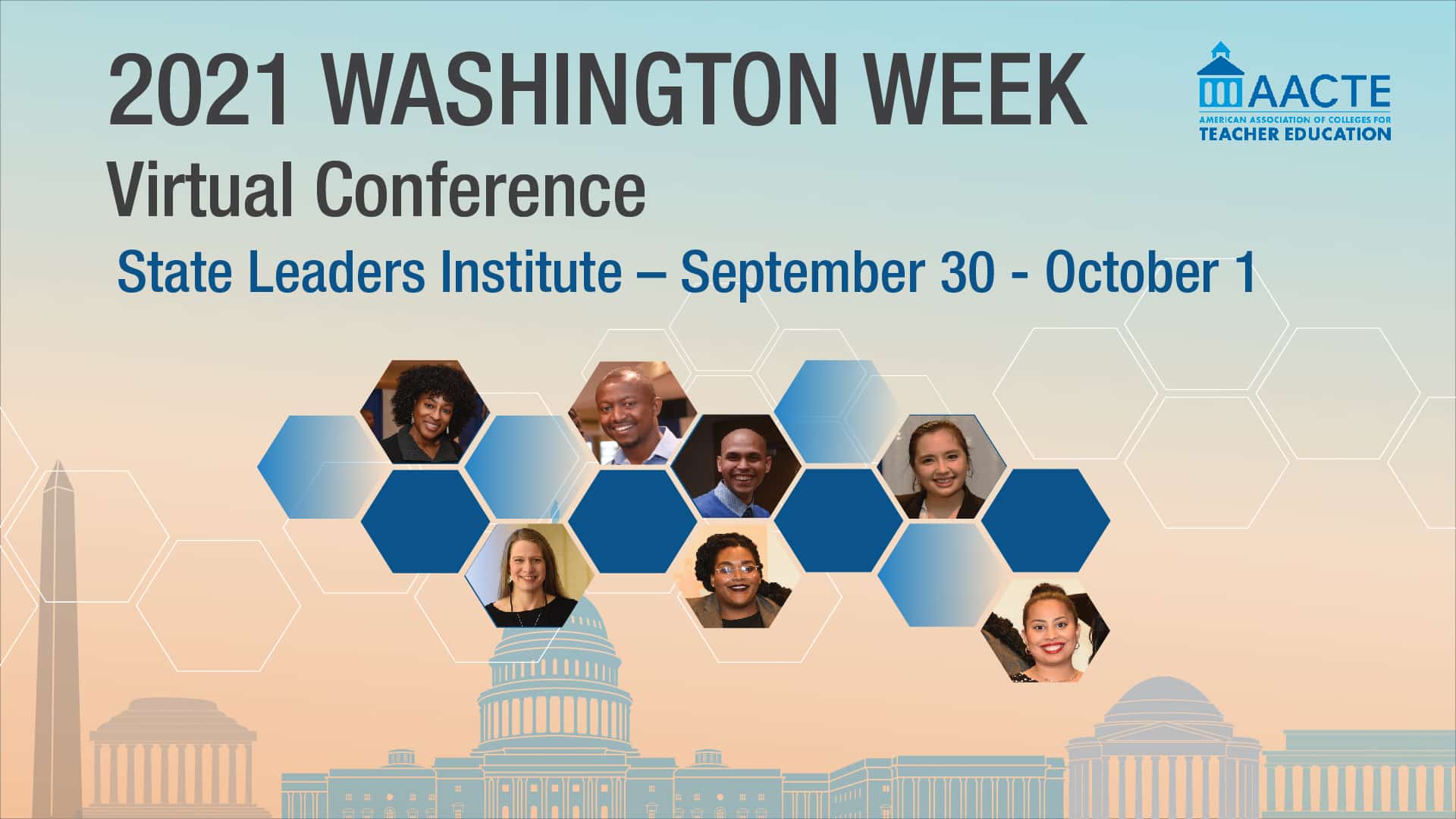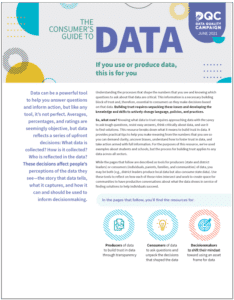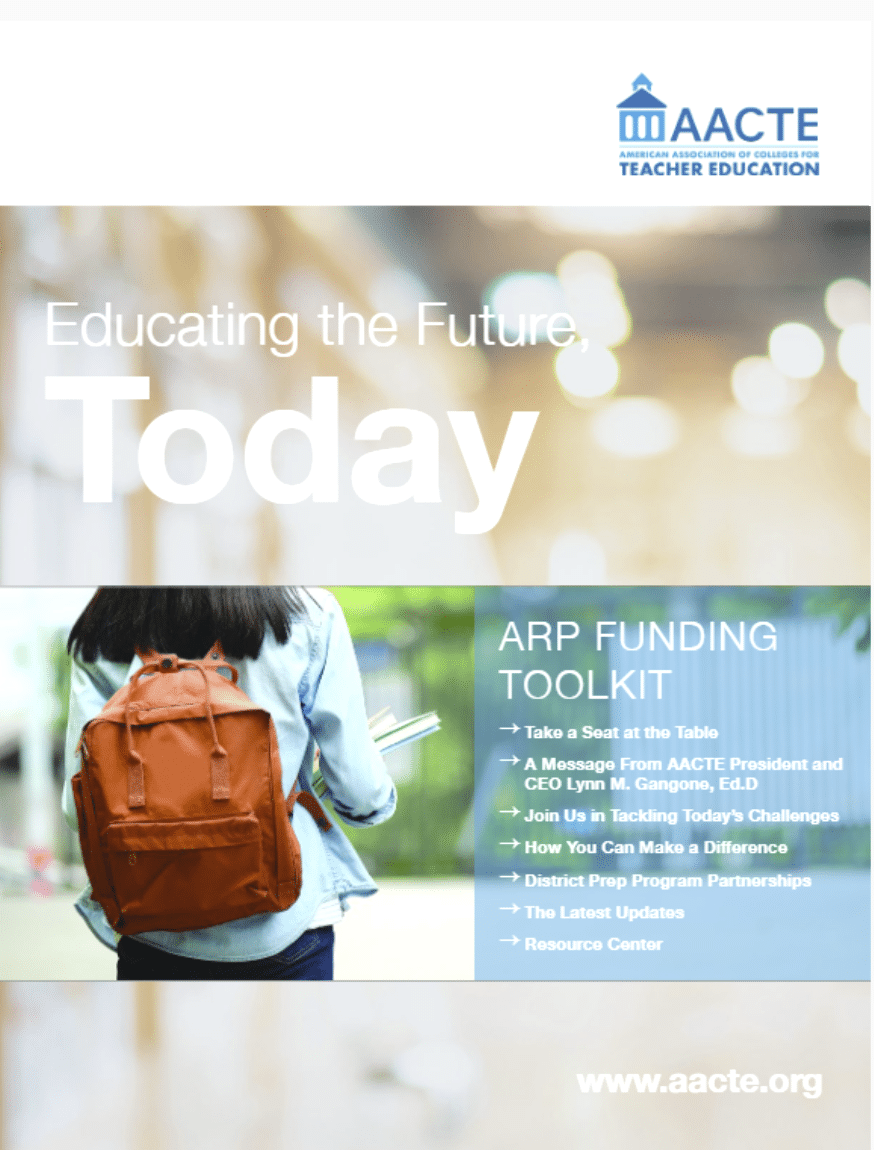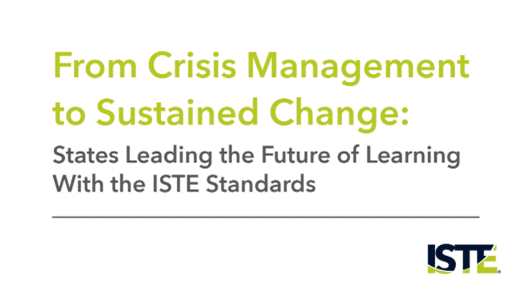19 Aug2021
By Christine C. Gorowara
 In a recent Q&A with AACTE, Christine Carrino Gorowara, past president of the Delaware Association of Colleges for Teacher Education, shares her perspective as a frequent attendee of the Washington Week State Leaders Institute.
In a recent Q&A with AACTE, Christine Carrino Gorowara, past president of the Delaware Association of Colleges for Teacher Education, shares her perspective as a frequent attendee of the Washington Week State Leaders Institute.
Why do you believe it is important for AACTE members to actively advocate for education? Why do you recommend AACTE members attend the State Leaders Institute?
AACTE members have specialized knowledge about education issues and provide an invaluable perspective to lawmakers. Additionally, part of our role in preparing educators is doing what we can to create an environment where educators can thrive, including ensuring funding, promoting culturally responsive policies, and expanding opportunity. The State Leaders Institute helps us hone our knowledge of issues relevant to educator preparation and how those issues are connected to pending legislation and develop the skills needed to advocate effectively.
What are you most looking forward to at this year’s State Leaders Institute?
As informative as the speakers always are, I most look forward to the opportunity to learn from other state chapters. I love learning about what kinds of events they hold, what resources and services they provide their members, how they work with partner organizations, and their innovative ideas for moving the profession forward.
28 Jun2021
By Blair Mann
 As advocates, we want data to be used for accountability and transparency, to tell stories, and to inform impactful, equitable policies. But without context, clarity, transparency, the stories data could tell about school, student, and teacher experiences can be lost to misinformation and distrust.
As advocates, we want data to be used for accountability and transparency, to tell stories, and to inform impactful, equitable policies. But without context, clarity, transparency, the stories data could tell about school, student, and teacher experiences can be lost to misinformation and distrust.
Last week, the Data Quality Campaign released a new resource that breaks down what it means to build trust in data for both those who share it and those who consume it—providing tips to make meaning from the numbers that you see so you can demand clarity, uncover biases, understand how to foster trust in data, and take action armed with full information.
This Consumer’s Guide to Data is an especially great resource for producers of data (such as state or district leaders) and consumers of data (parents, families, or interested community members), but it can also be valuable to advocates who are looking to support good decision making and storytelling at every level.
Download the guide.
17 Jun2021
By Ward Cummings
 The American Rescue Plan Act (ARP), a law providing $122 billion for the ARP Elementary and Secondary School Emergency Relief (ARP ESSER), was established to help state educational agencies and school districts address safety and sustainability concerns related to the coronavirus pandemic. Among other things, the funding provided by the measure is being used by state education systems to accelerate and sustain a safe return to in-person instruction, to expand access to vaccination for staff and students, to fund summer school and to help students cope with the loss of classroom time.
The American Rescue Plan Act (ARP), a law providing $122 billion for the ARP Elementary and Secondary School Emergency Relief (ARP ESSER), was established to help state educational agencies and school districts address safety and sustainability concerns related to the coronavirus pandemic. Among other things, the funding provided by the measure is being used by state education systems to accelerate and sustain a safe return to in-person instruction, to expand access to vaccination for staff and students, to fund summer school and to help students cope with the loss of classroom time.
In June of 2021, the U.S. Department of Education made public an online resource detailing how states plan to use the ARP ESSER funding. The online resource describes, for example, how New Jersey will use the funds to provide state-level support for school nurses and how New Mexico is setting up a $6 million joint program with local municipalities to provide summer internships for middle and high school students. Massachusetts will use the funds to offer summer school matching grants for school districts, and Oklahoma will use approximately $35 million to hire new school counselors, licensed mental health professionals and licensed recreational therapists.
14 Jun2021
By Jane E. West and Kaitlyn Brennan

This blog post is written by AACTE consultant Jane West and is intended to provide updated information. The views expressed in this post do not necessarily reflect the views of AACTE.
The Attack on Critical Race Theory Continues
In a Washington Update last month, we offered a distressing summary of how the teaching of our nation’s racial history has been thrown into the heart of the political arena. Unfortunately, the trend is continuing and gaining traction. Last week, Rep. Virginia Foxx (R-NC), the top Republican on the House Education and Labor Committee, announced her support for two bills intended to block the teaching of critical race theory in K-12 schools. This week Republican Sens. Marsha Blackburn (R-TN), Mike Braun (R-IN) and Rick Scott (R-FL) introduced a resolution condemning the use of critical race theory in K-12 schools and teacher preparation programs. “Critical race theory has no place in American schools,” Blackburn said in a statement. “This resolution is an important step to prevent the far left from pushing their radical political agenda in our classrooms.”
24 May2021
By Michael Rose
 President Biden signed into law the American Rescue Plan Act (ARP) in March, which includes $122 billion for the ARP Elementary and Secondary School Emergency Relief (ARP ESSER) Fund. The ARP ESSER funds are intended to help state educational agencies and school districts safely reopen and address the impact of COVID-19 on the nation’s students. AACTE has developed the Educating the Future, Today toolkit to help members navigate conversations with state or local education leaders, encouraging them to use ESSER funds to staff classrooms with teacher candidates.
President Biden signed into law the American Rescue Plan Act (ARP) in March, which includes $122 billion for the ARP Elementary and Secondary School Emergency Relief (ARP ESSER) Fund. The ARP ESSER funds are intended to help state educational agencies and school districts safely reopen and address the impact of COVID-19 on the nation’s students. AACTE has developed the Educating the Future, Today toolkit to help members navigate conversations with state or local education leaders, encouraging them to use ESSER funds to staff classrooms with teacher candidates.
These funds provide a unique opportunity for school districts and educator preparation programs to address the teacher pipeline. As the U.S. Department of Education’s noted in its COVID-19 Handbook, Volume 2: Roadmap to Reopening Safely and Meeting All Students’ Needs, ARP ESSER funds can be used to staff classrooms with teacher candidates, thereby providing them with practical experience while helping alleviate the challenges teachers are encountering with the transition back to in person teaching.
12 May2021
By Anne Tapp Jaksa, Beth Kubitskey and Christine C. Gorowara

One value of being a member of AACTE is the national advocacy for the profession and information about federal regulations influencing the field. What does not go unnoticed is the need and priority of work at the state level. The state level ACTEs provide a space for influencing state policies that ultimately guide the profession. AACTE values these essential contributions, and recognizes the value of this work as also informing advocacy going forward. A third, and critical, addition to this professional triumvirate is AACTE’s Advisory Council of State Representatives (ACSR) community, which serves as a collaborative network of State chapters. ACSR provides a place to share common issues, goals, events, white papers, advocacy tips, etc. at the regional level during monthly meetings. This serves each state well as our shared goal is to serve our students, pre- and in-service teachers and leaders, which is tertiary to our desire to prepare quality teachers and leaders for today’s and tomorrow’s P-12 children. Here we share a brief snippet of some of the contributions of ACSR.
12 May2021
By Ward Cummings
 The Ohio Deans Compact on Exceptional Children has a mission to act collectively in support of improved learning and results for all children, but especially those from marginalized groups. Compact serves as a forum for shared learning and collective action. Due to its efforts, critical connections have been made within and outside the state through representation from key stakeholder groups, including the members of Ohio Association of Colleges for Teacher Education and AACTE.
The Ohio Deans Compact on Exceptional Children has a mission to act collectively in support of improved learning and results for all children, but especially those from marginalized groups. Compact serves as a forum for shared learning and collective action. Due to its efforts, critical connections have been made within and outside the state through representation from key stakeholder groups, including the members of Ohio Association of Colleges for Teacher Education and AACTE.
The 30-member organization meets quarterly and is comprised of leaders from the Ohio Department of Education and the Ohio Department of Higher Education (ODHE). Compact members participate on one of four standing committees (Dissemination, Impact Evaluation, Low Incidence, Policy). Institutions that are awarded incentive grants through the Compact participate in a facilitated community of practice (CoP), which serves as a peer-to-peer network for representatives from public and private institutions.
29 Jan2021
By Ji Soo Song
 ISTE has released its newest policy report, “From Crisis Management to Sustained Change: States Leading the Future of Learning With the ISTE Standards.”
ISTE has released its newest policy report, “From Crisis Management to Sustained Change: States Leading the Future of Learning With the ISTE Standards.”
Fueled by the rapid transition to online and blended instruction in response to COVID-19 and continued need to equitably improve student outcomes, educators, and leaders across the country have faced an unprecedented challenge to design, implement, and scale learning strategies made possible through technology. This challenge also presents a new opportunity, as systems and strategies used to address COVID-19 can also propel our schools forward towards the future of learning and better meet students’ and educators’ needs.
13 Jan2021
By Brian McNeill

This article originally appeared in VCU News and is reprinted with permission.
Andrew P. Daire, Ph.D., dean of the School of Education at Virginia Commonwealth University, was appointed Wednesday as a co-chair of Virginia’s new advisory committee charged with making recommendations on culturally relevant and inclusive education practices in Virginia’s public schools.
The Culturally Relevant and Inclusive Education Practices Advisory Committee, which was established by the General Assembly during the 2020 session, held its inaugural virtual meeting Wednesday and Gov. Ralph Northam announced its leadership and members.
“Inclusive and culturally relevant learning environments are vital to creating equitable pathways to success for all Virginians,” Northam said in a news release. “The work of this committee will advance our ongoing efforts to tell the complete and accurate story of Virginia’s complex past, improve our history standards, and give educators opportunities to engage in important conversations and lessons with their students.”
14 Dec2020
By Lynn M. Gangone
These are indeed difficult times for all levels of education, yet AACTE member institutions remain dedicated to high-quality, evidence-based preparation that assures educators are ready to teach all learners. AACTE continues to advocate for and support schools and colleges of education in their efforts to navigate the teacher shortage and COVID-19 related financial challenges, and their work to identify viable solutions to the multiple challenges that currently impact education.
The global pandemic has deepened the national teacher shortage crisis. College and university programs that prepare our teachers, principals, school counselors, and other essential education professionals are experiencing a debilitating wave of closures and faculty layoffs. The rising demand for high-quality education in the 21st century and achieving a prosperous quality of life for themselves and their families. It is critical now more than ever to recruit diverse, talented people into the education profession, which requires our nation’s leaders allocating funds to aid colleges and universities in their recovery from the significant financial challenges caused by the pandemic. It is also critical for legislators to revamp policies and practices to support a diverse education workforce.
10 Nov2020
By Jane E. West
As of July 1, 2020 all universities were required to comply with 2019 federal state authorization regulations. Among the requirements in these complex regulations is one related to all programs that fulfill educational requirements of a profession that requires licensure or certification. Included among these programs are those in schools and colleges of education—for teachers, psychologists, school counselors and more. Every university with such programs is required to make public, for each state, whether the program does or does not meet such requirements. For example, a special education teacher preparation program at a university in Florida must disclose whether its requirements would lead to certification in Minnesota.
MSU determined to provide a university-wide compilation of program requirements in relation to state certification requirements rather than a college by college compilation. Who was involved? What is the utility of doing it this way?
At MSU, compliance with this requirement took a village and included substantial support from university-level offices. First, the General Counsel’s office and Registrar’s office worked with administrators from across campus to develop a plan for compliance with both these regulations and also the similar reporting about online programs required by NC-SARA. This group identified the sequence of necessary work and set out due dates for various pieces. Second, staff from the General Counsel’s office and Registrar’s office met as needed with individuals from colleges, in addition to continuing to meet with the ad hoc group that created the process. In response to a request from colleges, the university also took care of all the relevant notifications to current students, which was a great help.
27 Oct2020
By Ward Cummings

Election season is upon us. According to CNN, more than 50 million Americans have already cast their ballot in the 2020 election by mail or by early voting. Some predict that as many as two-thirds of the electorate will have voted before election day arrives on November 3. The remaining third of Americans will go to their neighborhood polling place next Tuesday and cast their vote in person for the men and women they want to see run their cities, municipalities, states and the country. Across the nation, hundreds of political offices are up for grabs and thousands of men and women have registered to have their names placed on the ballot. Some of the names will be familiar to voters, many more will not be. For those seeking information about candidates and candidate positions on education, AACTE is keenly positioned to help.
13 Oct2020
By Mary Murray
This article originally appeared in University Business and is reprinted with permission.

Photo by Nikolas Noonan on Unsplash
At the onset of the 2020-21 academic year, the educational system is in a coronavirus maze, wherein the turns are constantly changing, and the end seems out of sight. While state education departments, school districts and educator preparation programs (EPPs) are prepared—whether in class, online, or a hybrid of both—the pandemic reminds us how unpredictable the road ahead may be. Recently, some schools in the United States that reopened for in-class instruction have reversed their plans due to COVID-19 outbreaks.
08 Oct2020
By Tariq Akmal
This article is a personal reflection of the 2020 Washington Week State Leaders Institute by attendee Tariq Akmal.
 I was fortunate to attend the State Leaders Institute breakout session on State Government Advocacy with Three State Chapters. Attendees heard from Christine Carrino Gorowara of Delaware, Scott Hewitt of Florida, and Vanessa Anton and Robin Fuxa of Oklahoma. This session was a sharing of the different types of advocacy activities that were occurring in three states. The variation in state size/population was very evident in the scale of activities of each chapter. What did they hold in common? They are all active in advocacy work and are experiencing a teacher shortage in their states. Each panelist shared particular aspects of their association’s work with their state department of education, legislators, and other stakeholders within their states.
I was fortunate to attend the State Leaders Institute breakout session on State Government Advocacy with Three State Chapters. Attendees heard from Christine Carrino Gorowara of Delaware, Scott Hewitt of Florida, and Vanessa Anton and Robin Fuxa of Oklahoma. This session was a sharing of the different types of advocacy activities that were occurring in three states. The variation in state size/population was very evident in the scale of activities of each chapter. What did they hold in common? They are all active in advocacy work and are experiencing a teacher shortage in their states. Each panelist shared particular aspects of their association’s work with their state department of education, legislators, and other stakeholders within their states.
The Delaware Association of Colleges for Teacher Education (DACTE) had “flipped the script” on the traditional Day On the Hill approach and now brought specific Delaware legislators to their association for conversations regarding how DACTE could be a resource to legislators on educational issues and to build relationships so that DACTE would be invited to legislative initiatives on education. They invited members of the House and Senate Education Committee, in particular, which seems to be a highly effective strategy! Carrino Gorowara noted how they became collaborators in developing legislation that would be a help to Delaware teacher candidates in simplifying the background check process.
22 Sep2020
By Lynn M. Gangone
 In early spring, when the coronavirus (COVID-19) shut the doors to classrooms, there was an optimistic belief that by fall the obstacles of the pandemic would disappear and in-class instruction would return to normal. However, as states began to lift emergency orders and school districts prepared to reopen schools, it became evident that education leaders would still be grappling with the unpredictable public health crisis this fall.
In early spring, when the coronavirus (COVID-19) shut the doors to classrooms, there was an optimistic belief that by fall the obstacles of the pandemic would disappear and in-class instruction would return to normal. However, as states began to lift emergency orders and school districts prepared to reopen schools, it became evident that education leaders would still be grappling with the unpredictable public health crisis this fall.
With COVID-19 spreading more rapidly in some regions of the United States, each state must assess whether they can safely open schools. Recently, some school districts that deemed it safe to reopen have reverted to remote learning when students and/or teachers have tested positive for the coronavirus. Certainly, navigating the current crisis is complicated, and it is having a profound effect on educator preparation programs (EPPs).
Due to PK-12 school closures in the spring, many teacher candidates were unable to complete their clinical and field experiences in a classroom setting—typically a prerequisite for licensure. Acknowledging that a lack of new teachers entering the field would adversely impact the current teacher shortage crisis, EPPs responded with alternative learning opportunities to ensure that teacher candidates are prepared and competent to enter their own classrooms. As a result, many states have implemented emergency policy changes to licensure, thus enabling recent graduates to teach this fall.
 In a recent Q&A with AACTE, Christine Carrino Gorowara, past president of the Delaware Association of Colleges for Teacher Education, shares her perspective as a frequent attendee of the Washington Week State Leaders Institute.
In a recent Q&A with AACTE, Christine Carrino Gorowara, past president of the Delaware Association of Colleges for Teacher Education, shares her perspective as a frequent attendee of the Washington Week State Leaders Institute. 






 As advocates, we want data to be used for accountability and transparency, to tell stories, and to inform impactful, equitable policies. But without context, clarity, transparency, the stories data could tell about school, student, and teacher experiences can be lost to misinformation and distrust.
As advocates, we want data to be used for accountability and transparency, to tell stories, and to inform impactful, equitable policies. But without context, clarity, transparency, the stories data could tell about school, student, and teacher experiences can be lost to misinformation and distrust.  The American Rescue Plan Act (ARP), a law providing $122 billion for the ARP Elementary and Secondary School Emergency Relief (ARP ESSER), was established to help state educational agencies and school districts address safety and sustainability concerns related to the coronavirus pandemic. Among other things, the funding provided by the measure is being used by state education systems to accelerate and sustain a safe return to in-person instruction, to expand access to vaccination for staff and students, to fund summer school and to help students cope with the loss of classroom time.
The American Rescue Plan Act (ARP), a law providing $122 billion for the ARP Elementary and Secondary School Emergency Relief (ARP ESSER), was established to help state educational agencies and school districts address safety and sustainability concerns related to the coronavirus pandemic. Among other things, the funding provided by the measure is being used by state education systems to accelerate and sustain a safe return to in-person instruction, to expand access to vaccination for staff and students, to fund summer school and to help students cope with the loss of classroom time. 
 President Biden signed into law the American Rescue Plan Act (ARP) in March, which includes $122 billion for the ARP Elementary and Secondary School Emergency Relief (ARP ESSER) Fund. The ARP ESSER funds are intended to help state educational agencies and school districts safely reopen and address the impact of COVID-19 on the nation’s students. AACTE has developed the
President Biden signed into law the American Rescue Plan Act (ARP) in March, which includes $122 billion for the ARP Elementary and Secondary School Emergency Relief (ARP ESSER) Fund. The ARP ESSER funds are intended to help state educational agencies and school districts safely reopen and address the impact of COVID-19 on the nation’s students. AACTE has developed the 
 The Ohio Deans Compact on Exceptional Children has a mission to act collectively in support of improved learning and results for all children, but especially those from marginalized groups. Compact serves as a forum for shared learning and collective action. Due to its efforts, critical connections have been made within and outside the state through representation from key stakeholder groups, including the members of Ohio Association of Colleges for Teacher Education and AACTE.
The Ohio Deans Compact on Exceptional Children has a mission to act collectively in support of improved learning and results for all children, but especially those from marginalized groups. Compact serves as a forum for shared learning and collective action. Due to its efforts, critical connections have been made within and outside the state through representation from key stakeholder groups, including the members of Ohio Association of Colleges for Teacher Education and AACTE. ISTE has released its newest policy report, “From Crisis Management to Sustained Change: States Leading the Future of Learning With the ISTE Standards.”
ISTE has released its newest policy report, “From Crisis Management to Sustained Change: States Leading the Future of Learning With the ISTE Standards.”


 I was fortunate to attend the State Leaders Institute breakout session on State Government Advocacy with Three State Chapters. Attendees heard from Christine Carrino Gorowara of Delaware, Scott Hewitt of Florida, and Vanessa Anton and Robin Fuxa of Oklahoma. This session was a sharing of the different types of advocacy activities that were occurring in three states. The variation in state size/population was very evident in the scale of activities of each chapter. What did they hold in common? They are all active in advocacy work and are experiencing a teacher shortage in their states. Each panelist shared particular aspects of their association’s work with their state department of education, legislators, and other stakeholders within their states.
I was fortunate to attend the State Leaders Institute breakout session on State Government Advocacy with Three State Chapters. Attendees heard from Christine Carrino Gorowara of Delaware, Scott Hewitt of Florida, and Vanessa Anton and Robin Fuxa of Oklahoma. This session was a sharing of the different types of advocacy activities that were occurring in three states. The variation in state size/population was very evident in the scale of activities of each chapter. What did they hold in common? They are all active in advocacy work and are experiencing a teacher shortage in their states. Each panelist shared particular aspects of their association’s work with their state department of education, legislators, and other stakeholders within their states.  In early spring, when the coronavirus (COVID-19) shut the doors to classrooms, there was an optimistic belief that by fall the obstacles of the pandemic would disappear and in-class instruction would return to normal. However, as states began to lift emergency orders and school districts prepared to reopen schools, it became evident that education leaders would still be grappling with the unpredictable public health crisis this fall.
In early spring, when the coronavirus (COVID-19) shut the doors to classrooms, there was an optimistic belief that by fall the obstacles of the pandemic would disappear and in-class instruction would return to normal. However, as states began to lift emergency orders and school districts prepared to reopen schools, it became evident that education leaders would still be grappling with the unpredictable public health crisis this fall.